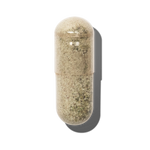The Science Behind Berberine
Found in barberry, goldenseal, goldthread and tree turmeric, a bright yellow plant extract has taken the wellness world by storm.
Enter berberine – with roots in Ayurvedic and traditional Chinese medicine, this powerful compound has been used for centuries to treat everything from diarrhoea to high blood sugar(1), now weaving its way into today’s conversations surrounding the topic of body composition.
But how does this ancient remedy translate into modern day wellness, especially when it comes to supporting a healthy metabolism and weight management beyond the “quick fix” or diet culture mentality?
Read on as we dive into the science behind berberine and its potential benefits in supporting a healthy metabolic system, exploring how it might influence body composition in a holistic way.
What is Berberine?
Berberine is a naturally occurring alkaloid with bioactive properties that influence the body's metabolic processes. It works by interacting with certain enzymes and cellular pathways, helping to turn on a “switch” in the cells that helps the body use sugar and fat more efficiently(2) – potentially impacting blood sugar control, fat metabolism and gut health.
Berberine’s impact on body composition
While berberine has gained viral popularity being dubbed online as “nature’s Ozempic”, it's crucial to remember that it's not a ‘miracle’ pill for weight loss.
Ongoing research has explored several mechanisms by which berberine might influence body composition, and may be therefore helpful to those looking to support weight management, including:
-
Metabolic health and fat metabolism: Scientific studies have begun to shed light on how Berberine works within our bodies to affect our metabolic processes. One important discovery is its ability to activate the AMP-activated protein kinase (AMPK), an enzyme often referred to as a "metabolic master switch." Activation of AMPK by berberine can increase fat burning and decrease fat storage, contributing to improved body composition or weight management over time(3).
-
Insulin sensitivity: Berberine activates the AMPK enzyme, which plays a role in regulating metabolism and insulin sensitivity. A key factor in managing blood sugar levels, insulin sensitivity describes how effectively our bodies use the hormone insulin to absorb glucose from the bloodstream. A study published in the Metabolism Journal highlighted berberine's effectiveness in reducing body mass index (BMI) and improving lipid profiles among participants(2).
-
Gut health: The millions of microorganisms in our intestines known as our gut microbiome are key players in our metabolic health. Studies have shown that berberine's anti-inflammatory and antimicrobial properties may positively impact the gut microbiome, potentially promoting the growth of beneficial bacteria and reducing the presence of harmful ones. This shift in gut microbiota composition may influence nutrient absorption, energy metabolism and appetite regulation(4).
While more research is needed to fully understand its long-term effects and optimal dosages, the current evidence suggests that berberine may play a supportive role in a holistic approach to body composition and therefore weight management, alongside the strong foundation of a healthy, balanced diet and regular movement.
References:
-
Zhang, Y., Li, X., Zou, D., Liu, W., Yang, J., Zhu, N., Huo, L., Wang, M., Hong, J., Wu, P., Ren, G. and Ning, G. (2008). Treatment of Type 2 Diabetes and Dyslipidemia with the Natural Plant Alkaloid Berberine. The Journal of Clinical Endocrinology & Metabolism, 93(7), pp.2559–2565. doi:https://doi.org/10.1210/jc.2007-2404.
-
Zhang, H., Wei, J., Xue, R., Wu, J.-D., Zhao, W., Wang, Z.-Z., Wang, S.-K., Zhou, Z.-X., Song, D.-Q., Wang, Y.-M., Pan, H.-N., Kong, W.-J. and Jiang, J.-D. (2010). Berberine lowers blood glucose in type 2 diabetes mellitus patients through increasing insulin receptor expression. Metabolism, 59(2), pp.285–292. doi:https://doi.org/10.1016/j.metabol.2009.07.029.
-
Cicero, A.F.G. and Baggioni, A. (2016). Berberine and Its Role in Chronic Disease. Advances in Experimental Medicine and Biology, [online] 928, pp.27–45. doi:https://doi.org/10.1007/978-3-319-41334-1_2.
-
Yin, J., Xing, H. and Ye, J. (2008). Efficacy of Berberine in Patients with Type 2 Diabetes Mellitus. Metabolism, 57(5), pp.712–717.
















































































